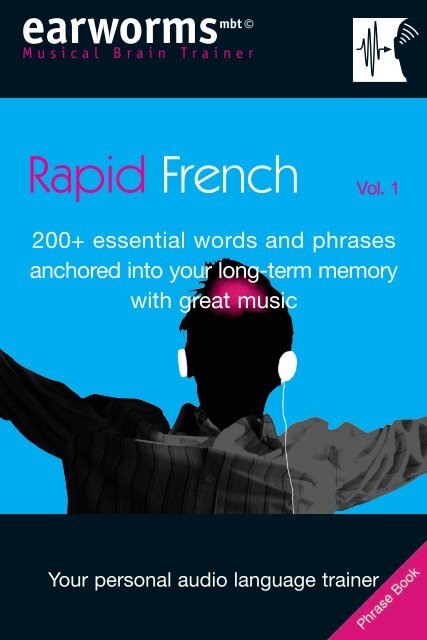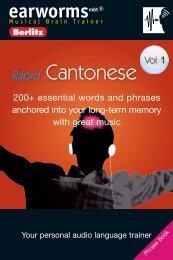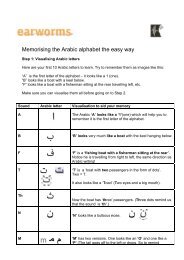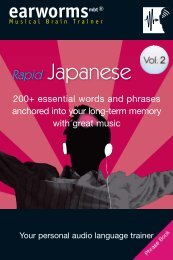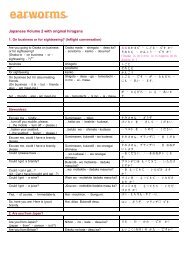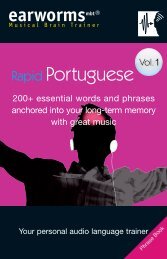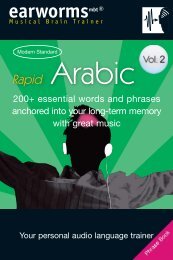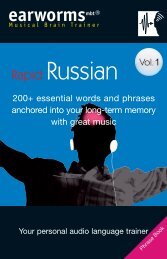Create successful ePaper yourself
Turn your PDF publications into a flip-book with our unique Google optimized e-Paper software.
earworms<br />
mbt<br />
<strong>Musical</strong> <strong>Brain</strong> <strong>Trainer</strong><br />
200+ essential words and phrases<br />
anchored into your long-term memory<br />
with great music<br />
Your personal audio language trainer<br />
©<br />
Vol. 1
Your personal audio language trainer
earworms mbt© Rapid French puts the words and<br />
phrases you need not just on the tip of your tongue, but<br />
also transports them deep into your long-term memory.<br />
Simply by listening to these specially composed melodies<br />
with their rhythmic repetitions of French and English a few<br />
times, the sound patterns are indelibly burned into your<br />
auditory cortex. You will have successfully learned the<br />
French phrase and have the correct accent ringing in your<br />
ears. Wherever you are, whatever you are doing: While<br />
jogging, in the car, in the bath, doing the ironing…you can<br />
be learning French at the same time!<br />
earworms mbt© Rapid Languages is the first language<br />
course to get your toe tapping.<br />
You know the phenomena of those catchy tunes or earworms<br />
that you just can't get out of your head? Voulezvous<br />
coucher avec moi, ce soir? Well, earworms mbt©<br />
has put this phenomena to positive use. Gone are the<br />
days of learning pressure and frustration at not being able<br />
to remember, the experience of many on conventional<br />
language courses. In combination with music, the phrases<br />
you need are automatically anchored deep into your<br />
memory, ready for instant recall.<br />
Music is the Key<br />
The idea is as simple as it is old. Before the age of writing,<br />
ancient historical events were recorded in verse and song<br />
form for easy memorisation. In his book 'Songlines'<br />
Bruce Chatwin describes how the Australian Aborigines<br />
were able to navigate their way across hundreds of miles<br />
of desert to their ancestral hunting grounds without maps.<br />
And how? The extensive lyrics of their traditional songs<br />
were exact descriptions of the routes!
Rhythm and words i.e. song and verse have always been<br />
a very powerful memory aid, and this is supported by<br />
recent scientific research. The advertising industry knows<br />
only too well how powerful music can be in getting<br />
the message across with brainwashing-like jingles and<br />
soundbites.<br />
It really works!<br />
Developed and used over years in the classroom,<br />
earworms mbt© Rapid Languages has shown<br />
phenomenal success. In tests pupils using this technique<br />
regularly get average marks of over 90% compared to less<br />
than 50% with conventional book based learning.<br />
Why hasn't music been used more in education up to<br />
now? Imagine kids at school getting a CD of hip hop<br />
songs with all the historical dates they have to learn, or all<br />
the irregular verbs they have to learn! Wouldn't that make<br />
their (and teachers’) school lives much easier, much<br />
more fun, much more successful? Rest assured, we are<br />
working on it!<br />
What you get<br />
This volume deals with the essentials for your<br />
visit abroad. It looks at typical situations: taking a taxi,<br />
at the hotel, at the restaurant, requesting, polite phrases,<br />
finding your way, numbers, dealing with problems and<br />
so on. Volume 2 will have you talking about yourself and<br />
others, past, present and future, likes and dislikes and<br />
general conversational items. The themes follow closely<br />
the Common European Framework for language learning,<br />
a recognised benchmark of language proficiency, and the<br />
emphasis is constantly on usefulness to the learner.
Memory hooks<br />
This booklet contains all the words and phrases spoken<br />
on the CD, both English and French, plus the sounds of<br />
the words. An additional aid to learning, 'memory hooks',<br />
and comments to assist your memorisation and understanding,<br />
can be found on the earworms website. These<br />
complement the CD and are really worth checking out.<br />
Memory hooks are for example, if you want to memorise<br />
the French term: buy = acheter (asheteh), imagine: ‘I’m<br />
going to buy an ashtray’ - and you will easily remember.<br />
How to use earworms: Don’t think, just listen!<br />
Sit back, relax and groove along to the melodies without<br />
trying to listen too hard. Treat them as songs you hear on<br />
the radio. Our recommendation is that you do familiarise<br />
yourself with the written words in the booklet - at least<br />
the first time you listen.<br />
After listening several times, playfully test yourself -<br />
cover up the English side of the phrase book and see<br />
how many words and phrases you remember!<br />
Lastly - a word of thanks<br />
The earworms team would like to thank you for putting<br />
your trust in our 'slightly different' learning concept<br />
and are sure that you will have the success that many<br />
others have already had. It's motivating to know that<br />
learners are really benefiting from our research and<br />
development. Also, as accelerated learning is a rapidly<br />
growing field, we look forward to hearing about your<br />
experiences and successes - so feel free to visit us<br />
on the website:<br />
www.earwormslearning.com
1. I would like…<br />
I would like…<br />
a coffee with milk<br />
a coffee<br />
with milk<br />
please<br />
I would like a coffee with milk.<br />
a tea<br />
a tea with milk<br />
and some sugar<br />
and<br />
Very good/Very well done.<br />
Thank you.<br />
Not at all, don't mention it.<br />
a beer<br />
water<br />
some water<br />
a carafe of water<br />
I would like to eat something.<br />
to eat<br />
something<br />
perfect<br />
earworms<br />
mbt<br />
<strong>Musical</strong> <strong>Brain</strong> <strong>Trainer</strong><br />
©<br />
Je voudrais…<br />
juh voodreh…<br />
un café au lait<br />
un kafeh oh leh<br />
un café<br />
un kafeh<br />
au lait<br />
oh leh<br />
s'il vous plaît<br />
seel voo pleh<br />
Je voudrais un café au lait.<br />
juh voodreh un kafeh oh leh<br />
un thé<br />
un teh<br />
un thé au lait<br />
un teh oh leh<br />
et du sucre<br />
eh dew sewkr<br />
et<br />
eh<br />
Très bien.<br />
tre byan<br />
Merci.<br />
mersee<br />
De rien.<br />
duh ryan<br />
une bière<br />
ewn byer<br />
l'eau<br />
l'oh<br />
de l'eau<br />
duh l'oh<br />
une carafe d'eau<br />
ewn karaf d'oh<br />
Je voudrais manger quelque chose.<br />
juh voodreh monjeh kelke shohz<br />
manger<br />
monjeh<br />
quelque chose<br />
kelke shohz<br />
parfait<br />
parfeh
2. To order<br />
to order<br />
a drink<br />
to order a drink<br />
I would like to order a drink.<br />
Of course.<br />
wine<br />
some wine<br />
I would like to order some wine.<br />
some red wine<br />
white wine<br />
some white wine<br />
a carafe of wine<br />
a small carafe of wine<br />
a bottle of wine<br />
bread<br />
some bread<br />
some olives<br />
a mixed salad<br />
a salad<br />
mixed<br />
some cheese<br />
You're welcome.<br />
commander<br />
komondeh<br />
une boisson<br />
ewn bwasawn<br />
commander une boisson<br />
komondeh ewn bwasawn<br />
Je voudrais commander une boisson.<br />
juh voodreh komondeh ewn bwasawn<br />
Bien sûr.<br />
byan sewr<br />
le vin<br />
luh van<br />
du vin<br />
dew van<br />
Je voudrais commander du vin.<br />
juh voodreh komondeh dew van<br />
du vin rouge<br />
dew van rooj<br />
le vin blanc<br />
luh van blon<br />
du vin blanc<br />
dew van blon<br />
une carafe de vin<br />
ewn karaf duh van<br />
un pichet de vin<br />
un peesheh duh van<br />
une bouteille de vin<br />
ewn booteh duh van<br />
le pain<br />
luh pan<br />
du pain<br />
dew pan<br />
des olives<br />
des oleeva<br />
une salade composée<br />
ewn salad kompozeh<br />
une salade<br />
ewn salad<br />
composée<br />
kompozeh<br />
du fromage<br />
dew fromaj<br />
Je vous en prie.<br />
juh vooz on pree<br />
Read the original text and phonetics to give yourself extra visual input.<br />
To perfect your pronunciation...<br />
Let your ears guide you!
3. Have you got …?<br />
Have you got...?<br />
Have you got sandwiches?<br />
Do you have...?<br />
Do you have a table for two?<br />
for three<br />
Yes, of course.<br />
No, sorry.<br />
Would you like to order?<br />
Do you want to order?<br />
a dessert<br />
Could I have...?<br />
more coffee<br />
Could I…?<br />
Enjoy your meal.<br />
Everything OK?<br />
Everything going well?<br />
everything<br />
The bill, please.<br />
I would like to pay.<br />
Can I pay…?<br />
by credit card<br />
no problem<br />
earworms<br />
mbt<br />
©<br />
<strong>Musical</strong> <strong>Brain</strong> <strong>Trainer</strong><br />
Avez-vous…?<br />
aveh voo<br />
Vous avez des sandwichs?<br />
vooz aveh deh sondwich<br />
Vous avez…?<br />
vooz aveh<br />
Avez-vous une table pour deux?<br />
aveh voo ewn tabl poor duh<br />
pour trois<br />
poor trwa<br />
Oui, bien sûr.<br />
wee, byan sewr<br />
Non, désolé.<br />
nawn, dezoleh<br />
Désirez-vous commander?<br />
deseereh voo komondeh<br />
Voulez-vous commander?<br />
vooleh voo komondeh<br />
un dessert<br />
un dehser<br />
Pourrais-je avoir…?<br />
poorej avwar<br />
plus de café<br />
plews duh kafeh<br />
Pourrais-je…?<br />
poorejuh<br />
Bon appétit.<br />
bawn apehtee<br />
Tout va bien?<br />
too va byan<br />
Tout va bien?<br />
too va byan<br />
tout<br />
too<br />
L'addition, s'il vous plaît.<br />
l'adeesyawn, seel voo pleh<br />
Je voudrais régler.<br />
juh voodreh regleh<br />
Puis-je régler...?<br />
pwee-juh regleh<br />
par carte de crédit<br />
par kart duh crehdee<br />
pas de problème<br />
pad problem
4. To the airport<br />
to the city centre<br />
I would like to go…<br />
to the airport<br />
We would like to go...<br />
to the Bristol hotel<br />
Thank you.<br />
Here you are, the rest is for you.<br />
to rent<br />
a car<br />
to buy<br />
I'd like to buy a pair of shoes.<br />
a pair of<br />
shoes<br />
What is the price?<br />
What is…<br />
the price<br />
How much do they cost?<br />
How much - cost - they?<br />
cost<br />
they<br />
dans le centre-ville<br />
don luh sontr veel<br />
Je voudrais aller...<br />
juh voodreh aleh<br />
à l'aéroport<br />
a lay'eropor<br />
Nous voudrions aller...<br />
noo voodreeon aleh<br />
à l'hôtel Bristol<br />
a l'ohtel breestol<br />
Merci.<br />
mersee<br />
Voilà, le reste est pour vous.<br />
vwala, luh rest eh poor voo<br />
louer<br />
looeh<br />
une voiture<br />
ewn vwatewr<br />
acheter<br />
asheteh<br />
Je voudrais acheter une paire de chaussures.<br />
juh voodreh asheteh ewn pair duh shohsewr<br />
une paire de<br />
ewn pair duh<br />
chaussures<br />
shohsewr<br />
Quel est le prix?<br />
kel eh luh pree<br />
Quel est…<br />
kel eh<br />
le prix<br />
luh pree<br />
Combien coûtent-elles?<br />
kawnbyan kootetel<br />
Combien coûtent-elles?<br />
kawnbyan - kootet - el<br />
coûtent<br />
kootet<br />
elles<br />
el
5. Numbers, days & time<br />
1<br />
2<br />
3<br />
4<br />
5<br />
6<br />
7<br />
8<br />
9<br />
10<br />
11<br />
12<br />
13<br />
14<br />
un<br />
un<br />
deux<br />
duh<br />
trois<br />
trwa<br />
quatre<br />
katr<br />
cinq<br />
sank<br />
six<br />
sees<br />
sept<br />
set<br />
huit<br />
weet<br />
neuf<br />
nuhf<br />
dix<br />
dees<br />
onze<br />
awnz<br />
douze<br />
dooz<br />
treize<br />
trez<br />
quatorze<br />
katorz<br />
At what time? Some examples:<br />
at 7 o'clock<br />
at 8.30<br />
at 7.15<br />
at 9.40<br />
earworms<br />
mbt<br />
<strong>Musical</strong> <strong>Brain</strong> <strong>Trainer</strong><br />
©<br />
15<br />
16<br />
17<br />
18<br />
19<br />
20<br />
21<br />
22<br />
23<br />
midnight<br />
30<br />
40<br />
45<br />
50<br />
quinze<br />
kanz<br />
seize<br />
sez<br />
dix-sept<br />
deeset<br />
dix-huit<br />
deezweet<br />
dix-neuf<br />
deeznuhf<br />
vingt<br />
van<br />
vingt-et-un<br />
vanteun<br />
vingt-deux<br />
vantduh<br />
vingt-trois<br />
vantrwa<br />
minuit<br />
meenwee<br />
trente<br />
tront<br />
quarante<br />
karont<br />
quarante-cinq<br />
karontsank<br />
cinquante<br />
sankont<br />
à sept heures<br />
a set er<br />
à huit heures trente<br />
a weet er<br />
à sept heures quinze<br />
a set er kanz<br />
à neuf heures quarante<br />
a nuhf er karont
Now you try (mentally) filling in the gaps, and don't forget the 24 hour clock!<br />
at 10 o'clock<br />
at 11.30<br />
at 6.15<br />
at 8.40<br />
at 11 o'clock<br />
at 11.45<br />
at 9 in the evening (careful, 24 hour clock!)<br />
at 3.30 in the afternoon<br />
at 6.00 in the evening<br />
at 9.45 in the evening<br />
The days of the week:<br />
Monday<br />
Tuesday<br />
Wednesday<br />
Thursday<br />
Friday<br />
Saturday<br />
Sunday<br />
… dix …<br />
à … heures trente<br />
à … … quinze<br />
… … heures quarante<br />
… onze …<br />
à ... heures ...-cinq<br />
à …-…-un heures<br />
à quinze … trente<br />
à dix-... heures<br />
… vingt-et-un … quarante-…<br />
lundi<br />
lundee<br />
mardi<br />
mardee<br />
mercredi<br />
mercruhdee<br />
jeudi<br />
juhdee<br />
vendredi<br />
vondruhdee<br />
samedi<br />
samdee<br />
dimanche<br />
deemonsh
6. Is there …?<br />
Excuse me.<br />
Is there a bank near hear?<br />
Is there a…?<br />
a bank<br />
near here<br />
near<br />
here<br />
Is there a supermarket near here?<br />
Is there a post office near here?<br />
a good restaurant<br />
good<br />
not too expensive<br />
not<br />
too<br />
expensive<br />
too expensive<br />
Is there a good restaurant near here?<br />
Sorry, ...<br />
...I don't know.<br />
No idea.<br />
earworms<br />
mbt<br />
©<br />
<strong>Musical</strong> <strong>Brain</strong> <strong>Trainer</strong><br />
Excusez-moi.<br />
exkyoo-seh mwuh<br />
Y-a-t'il une banque près d'ici?<br />
yateel ewn bonk preh deesee<br />
Y-a-t'il une…?<br />
yateel ewn<br />
une banque<br />
ewn bonk<br />
près d'ici<br />
preh deesee<br />
près<br />
preh<br />
d'ici<br />
deesee<br />
Y-a-t-il un supermarché près d'ici?<br />
yateel un supermarsheh preh deesee<br />
Y-a-t-il une poste près d'ici?<br />
yateel ewn p'ost preh deesee<br />
un bon restaurant<br />
un bawn restohron<br />
bon<br />
bawn<br />
pas trop cher<br />
pa tro sher<br />
pas<br />
pa<br />
trop<br />
tro<br />
cher<br />
sher<br />
trop cher<br />
tro sher<br />
Y-a-t-il un bon restaurant près d'ici?<br />
Yateel un bawn restohron preh deesee?<br />
Desolé<br />
dayzoleh<br />
...je ne sais pas.<br />
juh nuh seh pa<br />
Aucune idée.<br />
ohkewn eedeh
How often do I have to listen to the earworms CD<br />
before I can really remember all the language on it?<br />
With the appeal of the earworms songs we<br />
hope that it is not a question of 'having to',<br />
it is rather a question of 'wanting to'. But seriously:<br />
the memory is like a muscle, it needs to be trained<br />
and exercised. Based on scientific studies, the<br />
ideal is listening relatively intensively at the<br />
beginning (the learning phase), thereafter<br />
listening periodically to review what you<br />
have learnt and refresh your memory.<br />
In practical terms this means listening to<br />
the whole album the first day, in order to<br />
'tune your ear in' to the sounds of the<br />
language. Then listen regularly, several<br />
times, over a period of one or two weeks,<br />
making sure that you listen to every song<br />
equally as many times. While listening,<br />
actually speak the words out loud, when<br />
you can, to get a feeling for their pronunciation.<br />
After this, go through the booklet<br />
and test your knowledge, picking out any<br />
gaps that you may wish to concentrate on.<br />
Lastly, the review phase. As we all know,<br />
memories fade, so it is important to refresh<br />
your memory by listening to the CD at your<br />
leisure, say once a week for the following few<br />
weeks. Thereafter, monthly.<br />
This review phase is crucial as it consolidates<br />
your knowledge and transfers it into your<br />
long-term memory. Although this demands<br />
self-discipline, it is of course without effort,<br />
as you are only listening to songs.<br />
The result is that you will be able to recall the<br />
words and phrases with the same ease that<br />
you remember your telephone number!
7. Directions<br />
Hello/Good morning.<br />
I'm looking for a supermarket.<br />
a post office<br />
a bank<br />
Can you tell me...<br />
how to get to/go to<br />
to the bank<br />
to the post office<br />
to the supermarket<br />
by bus, by car, by train<br />
by<br />
go straight on<br />
turn (to the) left<br />
turn<br />
turn (to the) right<br />
Is it far?<br />
two kilometres<br />
about, roughly<br />
on the left<br />
on the right<br />
Thank you.<br />
You're welcome.<br />
earworms<br />
mbt<br />
<strong>Musical</strong> <strong>Brain</strong> <strong>Trainer</strong><br />
©<br />
Bonjour.<br />
Bawnjoor<br />
Je cherche un supermarché.<br />
juh shersh un supermarsheh<br />
une poste<br />
ewn p'ost<br />
une banque<br />
ewn bonk<br />
Pouvez-vous me dire…<br />
pooveh voo muh deer<br />
comment aller<br />
komont aleh<br />
à la banque<br />
a la bonk<br />
à la poste<br />
a la p'ost<br />
au supermarché<br />
oh supermarsheh<br />
en bus, en voiture, en train<br />
on bews, on vwatewr, on tran<br />
en<br />
on<br />
allez tout droit<br />
aleh too drwa<br />
tournez à gauche<br />
toorneh a gohsh<br />
tournez<br />
toorneh<br />
tournez à droite<br />
toorneh a drwat<br />
C'est loin?<br />
say lwan<br />
deux kilomètres<br />
duh keelometr<br />
environ<br />
onveerawn<br />
à gauche<br />
a gohsh<br />
à droite<br />
a drwat<br />
Merci.<br />
mersee<br />
Je vous en prie.<br />
juh voos on pree
8. Where & what time?<br />
Where can I buy a bus ticket?<br />
Where...<br />
...can I?<br />
buy<br />
a bus ticket<br />
at the tobacco shop<br />
a train ticket<br />
Where is your luggage?<br />
my luggage<br />
our luggage<br />
over there<br />
It is over there?<br />
in<br />
the room<br />
Where are the toilets?<br />
upstairs<br />
downstairs<br />
(At) what time is breakfast?<br />
from seven to ten<br />
from … to …<br />
today, tomorrow, this afternoon, this evening<br />
perfect<br />
Où puis-je acheter un ticket de bus?<br />
oo pwee-juh asheteh un teekeh duh bews<br />
Où...<br />
oo<br />
...puis-je?<br />
pwee-juh<br />
acheter<br />
asheteh<br />
un ticket de bus<br />
un teekeh duh bews<br />
au bureau de tabac<br />
oh buroh duh taba<br />
un billet de train<br />
un beeyeh duh tran<br />
Où est votre bagage?<br />
oo eh vohtr bagaj<br />
mon bagage<br />
mawn bagaj<br />
notre bagage<br />
nohtr bagaj<br />
là-bas<br />
la ba<br />
C'est là bas?<br />
seh la ba<br />
dans<br />
don<br />
la chambre<br />
la shonbr<br />
Où sont les toilettes?<br />
oo sawn leh twalet<br />
en-haut<br />
on oh<br />
en-bas<br />
on ba<br />
A quelle heure est le petit-déjeuner?<br />
a kel er eh luh puhtee dehjuhneh<br />
de sept heures à dix heures<br />
duh set er a dees er<br />
de ... à ...<br />
duh … a …<br />
aujourd'hui, demain, cet après-midi, ce soir<br />
ohjoordwee, duhman, set apreh meedee, se swar<br />
parfait<br />
parfeh
9. Problems, problems!<br />
There is a problem…<br />
with the TV<br />
with<br />
the fridge<br />
I've lost my camera.<br />
I've lost…<br />
my camera<br />
my passport<br />
my wallet<br />
Is this it?<br />
Yes, it's mine.<br />
It's mine.<br />
I need…<br />
some stamps<br />
some plasters / Band-Aid (US Engl.)<br />
suncream<br />
some aspirins<br />
I need something against…<br />
a bad stomach (pains of the stomach)<br />
sunburn<br />
mosquitoes<br />
earworms<br />
mbt<br />
<strong>Musical</strong> <strong>Brain</strong> <strong>Trainer</strong><br />
©<br />
Il y a un problème…<br />
eelya un problem<br />
avec la télévision<br />
avek la tehlehveezyawn<br />
avec<br />
avek<br />
le frigidaire<br />
luh freejeedehr<br />
J'ai perdu mon appareil photo.<br />
jeh perdoo mawn appareh fotoh<br />
J'ai perdu…<br />
jeh perdoo<br />
mon appareil photo<br />
mawn appareh fotoh<br />
mon passeport<br />
mawn paspor<br />
mon portefeuille<br />
mawn portuhfuhy<br />
Est-ce-que c'est ça?<br />
eskuh seh sa<br />
Oui, c'est le mien.<br />
wee seluh meean<br />
C'est le mien.<br />
se luh meean<br />
J'ai besoin…<br />
jeh buhswan<br />
de timbres<br />
duh tanbr<br />
de pansements<br />
duh ponsmon<br />
de crème solaire<br />
duh krem soler<br />
d'aspirines<br />
d'aspeereen<br />
J'ai besoin de quelque chose contre...<br />
jeh buhswan duh kelkuh shohz kawntr<br />
les maux d'estomac<br />
leh moh destoma<br />
les coups de soleil<br />
leh koo duh solay<br />
les moustiques<br />
leh moosteek
10. Do you speak English?<br />
How are you? (informal)<br />
How are you? (formal)<br />
Do you speak English?<br />
French<br />
Sorry, I don't speak French.<br />
I speak French.<br />
don't<br />
I don't understand.<br />
I understand.<br />
It's difficult. (very difficult)<br />
easy<br />
My name is…<br />
What's your name?<br />
What is this?<br />
Do you like ice cream?<br />
Help yourself.<br />
It is good.<br />
See you later.<br />
Good night.<br />
See you tomorrow.<br />
Have fun, enjoy yourself.<br />
Comment ça va?<br />
komon sa va<br />
Comment allez-vous?<br />
komont aleh voo<br />
Parlez-vous anglais?<br />
parleh voo ongleh<br />
français<br />
fronseh<br />
Désolé, je ne parle pas français.<br />
dayzoleh, juh ne parluh pa fronseh<br />
Je parle français.<br />
juh parluh fronseh<br />
ne ... pas<br />
nuh ... pa<br />
Je ne comprends pas.<br />
juh nuh kawmpron pa<br />
Je comprends.<br />
juh kawmpron<br />
C'est difficile. (très difficile)<br />
seh deefeeseel (treh deefeeseel)<br />
facile<br />
faseel<br />
Je m'appelle…<br />
juh mappel<br />
Comment vous appelez-vous?<br />
komon vooz apuhleh voo<br />
Qu'est-ce que c'est?<br />
keskuh seh<br />
Aimez-vous de la glace?<br />
aymeh voo duh la glas<br />
Servez-vous.<br />
serveh voo<br />
C'est bon.<br />
seh bawn<br />
A plus tard.<br />
a plew tar<br />
Bonne nuit.<br />
bon nwee<br />
A demain.<br />
a duhman<br />
Amuse toi bien.<br />
amews twa byan
The science behind earworms mbt©<br />
1. How we learn<br />
A large part of learning in general and language<br />
learning in particular is to do with the memorisation<br />
of words, facts and other significant information. It's<br />
a well known fact that we use only a fraction of our<br />
brain power and traditional book learning is now<br />
recognised as not suiting every learner.<br />
earworms uses simple techniques which open up<br />
and exploit more of the brain's native power, and<br />
come under the heading of 'accelerated learning'.<br />
In the March 2005 issue of the journal 'Nature'<br />
researchers at Dartmouth College in the US<br />
reported that they had pinpointed the region<br />
of the brain where 'earworms' or catchy tunes reside,<br />
the auditory cortex. They found that the sounds and<br />
words that have actually been heard can be readily<br />
recalled from the auditory cortex where the brain<br />
can listen to them 'virtually' again and again.<br />
2. What we learn<br />
earworms mbt© adopts the so-called lexical<br />
approach to language. In essence, this means we<br />
look at language in terms of whole meaningful<br />
chunks, then break these down into their component<br />
bite-sized, easily absorbable parts and then<br />
reconstruct them. You not only learn complete,<br />
immediately useful phrases, you also intuitively<br />
learn something about the structure (the grammar)<br />
of the language. These 'chunks' which the learner<br />
can 'mix and match', gradually build up to cover<br />
whole areas of the language.
Also available in this volume:<br />
(coming soon) (coming soon)<br />
Also check out Rapid Volume 2<br />
Details at www.earwormslearning.com
The Tracks:<br />
1. I would like… 6:16<br />
2. To order 5:59<br />
3. Have you got...? 7:49<br />
4. To the airport 7:24<br />
5. Numbers, days & time 6:52<br />
6. Is there…? 6:21<br />
7. Directions 7:54<br />
8. Where & what time? 7:06<br />
9. Problems, problems! 6:50<br />
10. Do you speak English? 6:27<br />
11. A bientôt! 1:05<br />
Concept and Development: Marlon Lodge, Project Management: Andrew & Maria Lodge,<br />
Text: Renate Elbers-Lodge, Music: James Berry, ML & AKM, Songs 5,6,9 feature samples by<br />
www.platinumloops.com, Pedagogic Support: Bob Glynn. Recorded @ Humboldt Studios<br />
& Hill House Studios, Voices: Hélène Pollmann & Marlon Lodge, Mastered by Max Stamm<br />
@ Wildwood, Düsseldorf, Graphic Design: Jaroslaw Suchorski & Bernd Kreuder @ HKP.<br />
Special thanks to: Jan, Jane, Evie, Anna, Freddy, Matt Hinzmann, UKTI, Noisebox Digital Media.<br />
www.earwormslearning.com<br />
© 2006 earworms publishing Ltd.<br />
Catalogue no. EARW 0101<br />
Produced in the EU<br />
earworms<br />
mbt<br />
©<br />
<strong>Musical</strong> <strong>Brain</strong> <strong>Trainer</strong>


